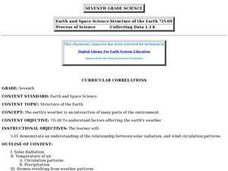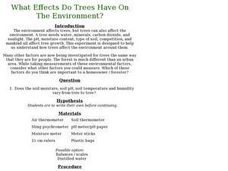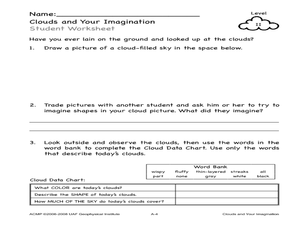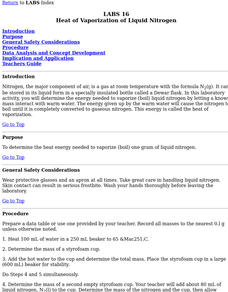Curated OER
Meteorology
Seventh graders examine the job of meteorologists. They decide which characteristics of the atmosphere that meteorologists focus on. They use local weather maps from newspapers to predict weather in their area.
Curated OER
Investigation 2 - Greenhouses
Third graders set up a miniature greenhouse to help them explain how nonliving things affect the growth of living things.
Curated OER
It's So Sticky Outside That...
Young scholars examine the phases of the water cycle and water's different forms it can have. They work in groups to create pantomimes to illustrate the water cycle to their classmates.
Curated OER
Earth's Weather
Seventh graders learn how solar radiation, latitude, and other factors affect weather. They break into six groups and are assigned a topic to research and to present their findings orally.
Curated OER
Tracking Ozone
Learners track an ozone event in Groton, CT. They compare weather changes and the subsequent ozone levels. Also, they make comparisons and determinations about ozone levels.
Curated OER
Will There Be Ozone Tomorrow
Students collect and analyze real time data. They make comparisons and determinations about the status of ozone in their local area and predict the Ozone level for the next day
Curated OER
Meteorologist for a Day
Students research weather patterns, predict the weather for a US city and write a weather forecast that be presented to the class. The forecast should explain their weather prediction and the weather patterns and conditions it is based on.
Curated OER
Heating a House in German
Students reinforce and expand their knowledge of other disciplines through the target language.
Curated OER
What Effects Do Trees Have On The Environment?
Students examine the interrelationship between trees, soil and people focusing on urban areas. They collect and analyze data about trees in their research area.
Curated OER
Water
Students examine water, its function and how much you should consume. In this water lesson plan students study water and why it is important, how much you should drink and what its functions are in your body.
Curated OER
Physics Post-Lab
Young scholars explore physics. In this science lesson, students discuss physics in their everyday lives. Young scholars complete a physics worksheet.
Curated OER
Clouds and Your Imagination
Learners study and illustrate clouds. In this cloud study lesson, students study clouds and then illustrate what they see. Learners use their imaginations to interpret images from the cloud picture they drew.
Curated OER
Heat of Vaporization of Liquid Nitrogen
Students determine the heat energy needed to vaporize (boil) one gram of liquid nitrogen.
Curated OER
Weather Predictions
Fourth graders explore meteorologists. They explore symbols on a weather map and make five day forecasts.
Curated OER
Sustaining Life Under the Ice
Students design and conduct experiments in order to identify the components of lake water environments that are affected by winter ice cover. They use the experiment results to propose effective human management of these ecosystems.
Curated OER
Severe Weather Planning
Fourth graders research the need to prepared for a severe weather event. They select one type of weather condition and explain how to be prepared in a report.
Curated OER
Understanding Cloud Formation
Students read and relate the poem, "Clouds" by Aileen Fisher to a demonstration on cloud formation. They create clouds in jars using ice water and matches then discuss the ways clouds can be used to predict weather.
Curated OER
Robert Boyle's Informants
Students review and discuss the importance of Boyle's informants and how he sometimes relied on information from those with experience of the wider world to substantiate his scientific theories. They complete the worksheet, answering...
Curated OER
The Energy Debate - Sea Level Rise
Students comprehend the impact of global warming on our coastal cities. They appreciate how geographic information systems can be used to represent scientific data. Students research the melting of the ice caps in Antarctica and the Arctic.
Curated OER
Graphin' And Glyphin' Utah Weather
Fourth graders investigate the concepts of looking at sets of data. The focus of the study is upon the local weather of Utah. They study the weather found in the city and in the country and make comparisons based upon geographical location.
Curated OER
Adhesion of Caulks to Surface -- Testing Product Quality
Learners test the adhesive quality of commercial caulk to determine the differences in materials that are seemingly similar.
Curated OER
Decomposers at Work!
Students design and conduct investigations that illustrate the process of decomposition. After a lecture/demo, students simulate the process of soil composting in the classroom. They closely chart the decomposition of their soil.
Curated OER
Learning From Leaves: Adaptation Scavenger Hunt
Learners participate in an adaptation scavenger hunt at. They obtain various plant specimens, and sort the plants based on whether they came from a desert, tropical rainforest, or wetlands.
Curated OER
Making Community Measurements: Which Plant Part?
Students identify a plant in a given community and make a variety of measurements. They determine how a plant meets its basic needs. In addition to identifying plant parts, they observe seasonal change and compare plants within a community.
Other popular searches
- Air Temperature and Wind
- Sunlight Air Temperature
- Air Temperature and Wind]
- Snow and Air Temperature
- Candle Air Temperature
- Air Temperature Pressure
- Temperature and Air Movement
- Air Temperature Air Pressure
- Oceans and Air Temperature
- Air Temperature Lesson Plan
- Atmosphere and Air Temperature

























